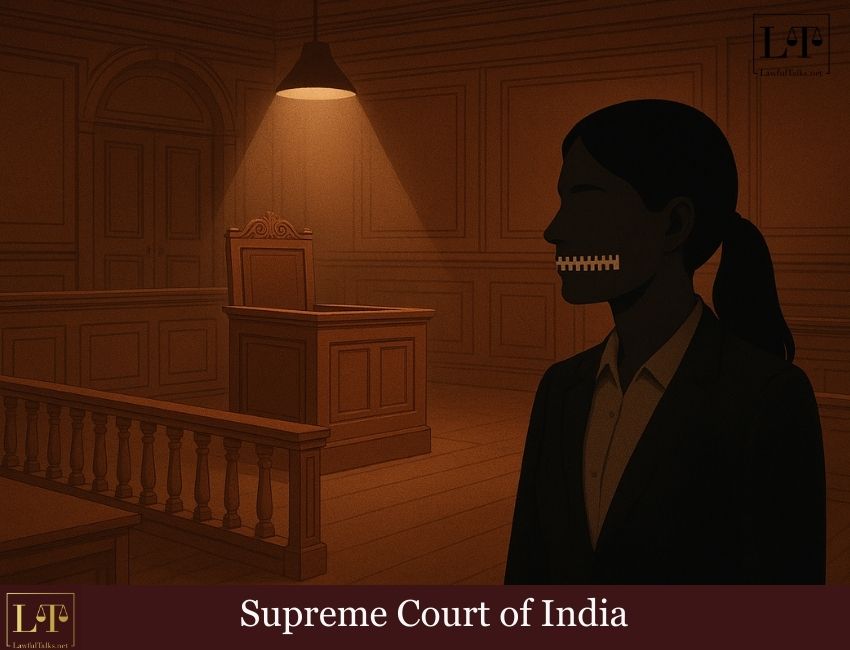Allahabad HC Sets Aside Afzal Ansari's Conviction, Allows Him to Continue as MP

The Supreme Court, in its judgment delivered by Justice Sanjay Karol and Justice Prashant Kumar Mishra, reiterated that when the facts lie within a party’s exclusive personal knowledge, refusing to testify can have grave consequences. This principle was applied in a family property dispute where children claimed their share on the basis of their mother’s marriage to the deceased.

Background :
The case revolved around ancestral property and competing claims between two branches of a family. The plaintiffs claimed entitlement as children of the first wife of one Dasabovi, while the defendants, led by the second wife, denied the first marriage altogether.
To support their claim, the plaintiffs relied on Section 50 of the Evidence Act, producing testimony from an elderly villager, Hanumanthappa (P.W.2), who had “special means of knowledge” about the marriage.
In contrast, the second wife merely produced revenue records showing her name with the deceased, asserting that this proved her sole marital status and exclusive rights to the property. Crucially, she herself never stepped into the witness box to testify on the most material question — whether Dasabovi had indeed married the plaintiffs’ mother.
Evaluating Evidence and the Presumption of Marriage
The Court carefully analysed the evidence presented. Justice Mishra noted that while documentary proof of marriage was absent, P.W.2’s testimony was rooted in personal knowledge and long familiarity with both families.
His deposition remained unshaken during cross-examination and was supported by the genealogical chart submitted by the plaintiffs.
Relying on established precedents, the Court reaffirmed that long cohabitation between a man and woman raises a strong presumption of valid marriage. Badri Prasad v. Dy. Director of Consolidation and Ors. was referred to where the court held,
“A strong presumption arises in favour of wedlock where the partners have lived together for a long spell as husband and wife. Although the presumption is rebuttable, a heavy burden lies on him who seeks to deprive the relationship of legal origin. Law leans in favour of legitimacy and frowns upon bastardy.”
This principle, the Court observed, clearly tilted the balance in favour of the plaintiffs once their initial evidentiary burden was discharged.
Consequences of Refusing the Witness Box
The turning point of the judgment was the second wife’s refusal to testify. She claimed inability due to age and arthritis, yet court records revealed she was present during multiple hearings, including during periods when other witnesses were examined. The Court found no medical evidence to justify her silence.
In strong words, the bench observed:
“The failure of the defendants to substantiate their claims through documentary evidence is eclipsed by a more consequential omission. In a case where the principal controversy turns on matters lying within her exclusive personal knowledge, the silence of defendant No.1, her absence from the witness box, is not a procedural lapse but a calculated withdrawal from scrutiny.”
The bench added:
“The conspicuous silence of defendant no.1 strikes not merely as omission but as deliberate evasion. Defendant No. 1, who lies at the heart of the controversy, chose not to step into the witness box and depose regarding the relationship between the plaintiffs’ mother and her husband. Her testimony bore direct relevance not only to the status of plaintiffs’ mother but also her own position.”
The Court emphasized that civil proceedings demand candour from parties. By refusing to testify when she alone could clarify the facts, the second wife invited the statutory adverse presumption under Section 114(g) of the Evidence Act.
Court’s Findings
The Supreme Court held that the plaintiffs had satisfactorily discharged their evidentiary burden. In contrast, the defendants relied only on bare denials and revenue entries, which the Court reiterated are not proof of title or marital status.
Summing up, Justice Mishra wrote:
“A Court of law cannot offer refuge to studied silence where a duty to disclose exists. The plaintiffs anchored their claim in measured and unwavering testimony of P.W.2 (Hanumanthappa), an account rooted in personal knowledge and long-standing familiarity, which withstood the rigours of cross-examination. His evidence, unshaken and consistent, found further corroboration in the genealogical chart presented by the plaintiffs. It, therefore, stands established that the plaintiffs have discharged the evidentiary burden imposed upon them by law. In contrast, the defendants, bereft of probative material or candour, resorted solely to denials. When measured against the touchstone of preponderance of probabilities, the scales unambiguously tilt in favour of the plaintiffs.”
Conclusion
The appeal was dismissed as meritless, and the High Court’s decision in favour of the plaintiffs was affirmed.
Case Details: Chowdamma(D) by LR and Another Versus Venkatappa (D) by LRs and Another

Het Dedhia
3rd Year Law Student from SVKM's Pravin Gandhi College of Law
Latest Posts
Categories
- International News 19 Posts
- Supreme Court 347 Posts
- High Courts 361 Posts


















































































































































































































































































































































































































































































































































































































































































































































